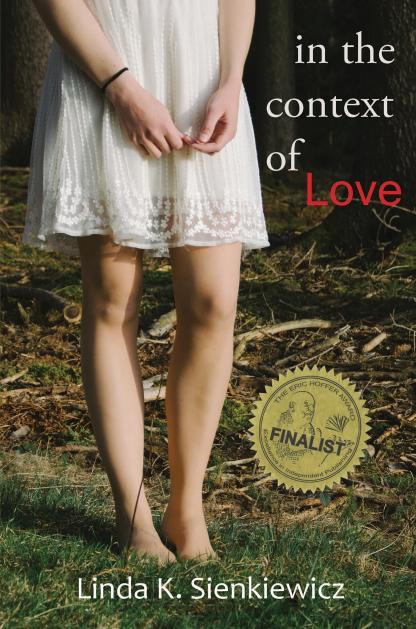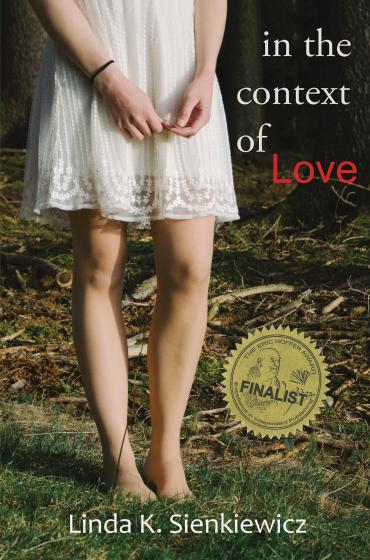Hello everyone! I hope all is well with you. I’ve got a guest today and she’s sharing her writing experience with us! Please welcome award-winning author Linda Sienkiewicz! And check out her novel, In the Context of Love! Take it away, Linda!
Do you ever “think outside the box”? What happens when you do? It can be daunting. As time goes on, insecurities creep in, and you begin to question yourself. You wonder if the risks are worth the gamble.
I want to tell you about my experience with my novel, In the Context of Love. It has an unusual point-of-view that’s not commonly used in book-length stories. During my search for a publisher, self-doubt caused me to take a big step backward.
In the novel, Angelica Schirrick is a mother with two young children who must reassess her life when her no-good husband lands in jail. As an overprotected teen, she suffered heartache after the sudden disappearance of her first and only love, Joe Vadas, a boy her parents disapproved of. This was followed by an unexpected betrayal within her family that derailed her life. After a succession of wrong choices, including a bad marriage, she realizes she needs to speak without shame about this devastating family secret. It’s her only salvation.
I had this wild idea—what if Angelica tells her story to her first love, the one who got away? I’d studied second person point-of-view while in an MFA program and even wrote my thesis on it. I figured I had nothing to lose by trying it, right?
Second person address, or apostrophe, has a strange and contradictory effect on readers. They understand Joe is a character in the novel, but they can’t help but step into the role of “you” simply by the nature of the second-person pronoun, as if Angelica were talking directly to them:

Nights were shadowy and deep with no stars, and I felt disoriented and exhausted in the morning, as if I’d been pushing my way through drifts of snow to get to the other side of something. The same old fears that began in high school, after you disappeared as cleanly as if you’d been tied to an engine block and dumped in Lake Erie, came back. Sheathed in blue ice, I had no more substance than the frosted air that eked from my lungs.
Late at night, when the children were in bed, I would turn to your old tattered notebook, tucked safely in a box in the back of my closet. Reading your poems was one of the few things that gave me solace:
You cannot pass from child to adult
without falling into holes of doubt,
broken wheels of trust
and traps of betrayal.
In what ways had you been betrayed? What holes of doubt did you have? I was certain you and I felt the same sadnesses, even though our childhoods were vastly different. This thought made me feel close to you, as if, even in your absence you understood all I’d been through—my horrible secret, my mother’s pain, my family’s betrayal, my husband’s disloyalty, and my own unfaithfulness.
Through the use of you, the reader is drawn into the relationship, and an intimate story (hopefully) becomes an intimate experience for the reader. It isn’t easy to pull off second-person in a novel length piece, though. I worried I was crazy for even trying it. People would hate it. It would never sell. My fear was so great that midway through my search for an agent, I switched the entire manuscript to a typical first person narrative.
After I did, I found an agent, but she was unable to sell the manuscript. Then I suffered a personal tragedy and didn’t touch my writing for two years. When I finally picked it back up, I returned the narrative to the second-person address. I also consulted an author/editor and made some structural changes. Energized and confident, I submitted the revamped manuscript to small literary presses that are more likely to take a chance on something outside the mainstream. Shortly after, Buddhapuss Ink LLC offered me a contract.
In the Context of Love is an Eric Hoffer Book Award Finalist and has an Honorable Mention in the Great Midwest Book Festival.
So, there are times when you just have to trust yourself and the process. I’m glad I didn’t give up on my original concept. I believe the use of “you” contributes to the positive way readers tell me they relate emotionally to the narrator. Bunny Goodjohn, in Mom Egg Review, says “Sienkiewicz’s decision to cast the narrative as a loose address to Joe affords the layer of suspense that remains wonderfully unresolved until the novel’s very end.” Until then, readers aren’t sure if Joe is alive and if Angelica’s heart will ever be mended.
______________________________________________________

Linda K Sienkiewicz, award-winning author of In the Context of Love, attributes her creative drive to her artistic mother, who taught her to sew, and her father, who let her monkey around with the gadgets in his workshop. Her poetry, fiction and art have been published in more than fifty literary journals. She has a poetry chapbook award from Bottom Dog Press, Pushcart Prize nomination in poetry, and an Eric Hoffer Finalist Award for her novel, In the Context of Love. Linda grew up south of Cleveland, Ohio, and now lives in Rochester, MI. She is a volunteer for Rochester Area Neighborhood House Inc., a nonprofit human service organization.
In the Context of Love is available on Amazon and Barnes and Noble.

Website: http://lindaksienkiewicz.com
Twitter: https://twitter.com/LindaKSienkwicz
Facebook: https://www.facebook.com/lindasienkiewicz.author
Amazon: http://www.amazon.com/Linda-K.-Sienkiewicz/e/B00JNEX4T8
